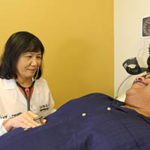
June is Men’s Health Month, and healthcare professionals across the nation are working to raise awareness of the importance of routine medical exams for men. Orlando-area doctors are concerned that only about half of adult men get an annual physical and a third do not feel the need for annual health screenings at all.
“It’s easy to take our health for granted until a serious issue arises,” Dr. Duron Lee, primary care and sports medicine physician at UCF Lake Nona Hospital, part of HCA Florida Healthcare. “Regular checkups and screenings are key to catching potential problems early on, when they are most treatable. Routine physicals can detect early-stage conditions such as heart disease, cancer, stroke, lung disease and diabetes. We encourage all men to prioritize their health, not just during Men’s Health Month but year-round.”
Men under age 40 should have a wellness physical every two to five years, annually for those age 40+.Here are some of the more common screening recommendations men should make part of their routine care.
Blood pressure check: Annual blood pressure checks are crucial, as untreated high blood pressure can lead to heart disease, stroke and other serious conditions.
Check cholesterol levels: Monitoring cholesterol levels annually also is essential for assessing the risk of heart disease and stroke. Those with risk factors such as smoking, diabetes or family history should have their cholesterol levels checked more frequently.
Diabetes screening: The American Diabetes Association recommends annual screening for type 2 diabetes for age 45 and older, or sooner for those with risk factors.
Prostate screening: Starting at age 45, your doctor may recommend a prostate-specific antigen blood test. Early detection of prostate cancer can significantly improve treatment outcomes.
Colonoscopy: Regular colonoscopy screenings should begin at age 45, according to the American College of Gastroenterology, to detect for colon cancer and precancerous polyps. Colonoscopies are recommended every ten years, but those with a family history of colon cancer may need to be screened more frequently.
Testicular cancer screening: Starting in their late 20s,men should perform regular self-exams, checking for any unusual lumps, swelling or pain. Unlike other cancers, testicular cancer is most common in men in their late 20s to early 30s with an average diagnosis of 33 years.
For more information on men’s health screening recommendations, visit hcafloridahealthcare.com/healthy-living/blog/5-essential-health-screenings-for-men.
About UCF Lake Nona Hospital
Located in the heart of Orlando’s Medical City, UCF Lake Nona Hospital is a 64-bed, full-service medical and surgical acute care hospital serving Lake Nona and surrounding communities in Orange and Osceola counties. UCF Lake Nona Hospital offers 24/7 emergency care, luxury family birthing units, inpatient and outpatient surgery including minimally invasive and robotic technology, oncology, diagnostic imaging, weight loss surgery, laboratory services and a cardiac catheterization lab. The hospital employs the latest innovative solutions and life-saving technology, including non-invasive focused ultrasound incisionless brain surgery for the treatment of debilitating tremors and Parkinson’s disease. UCF Lake Nona Hospital is a partnership between UCF Academic Health and HCA Healthcare.
About HCA Florida Healthcare
HCA Florida Healthcare, a part of HCA Healthcare, is a family of more than 650 affiliated sites of care, including hospitals, physician practices, freestanding emergency rooms and urgent care centers. United as a statewide network in 2022, HCA Florida Healthcare includes approximately 11,100 experienced doctors and more than 84,000 colleagues working together to deliver equitable, evidence-based collaborative care through more than 11.6 million patient encounters each year. HCA Florida Healthcare is committed to improving more lives in more ways and giving back to the communities it serves. The network provides more than $903 million in uncompensated care and contributes nearly $2.2 million to community organizations across the state. In addition, HCA Florida Healthcare offers patients access to highly-trained specialists, including the state’s largest cardiovascular network. A strong advocate for the next generation of healthcare professionals, HCA Florida Healthcare is also a major supporter of university-based healthcare programs and residencies and fellowships throughout the Sunshine State. For more information, please visit HCAFloridaHealthcare.com.

